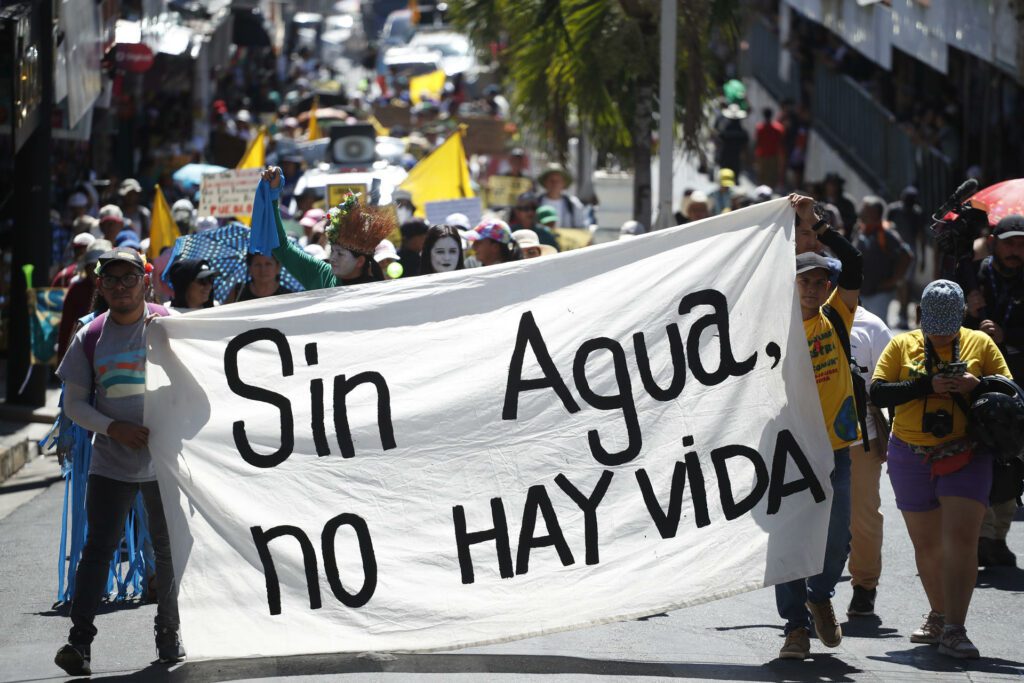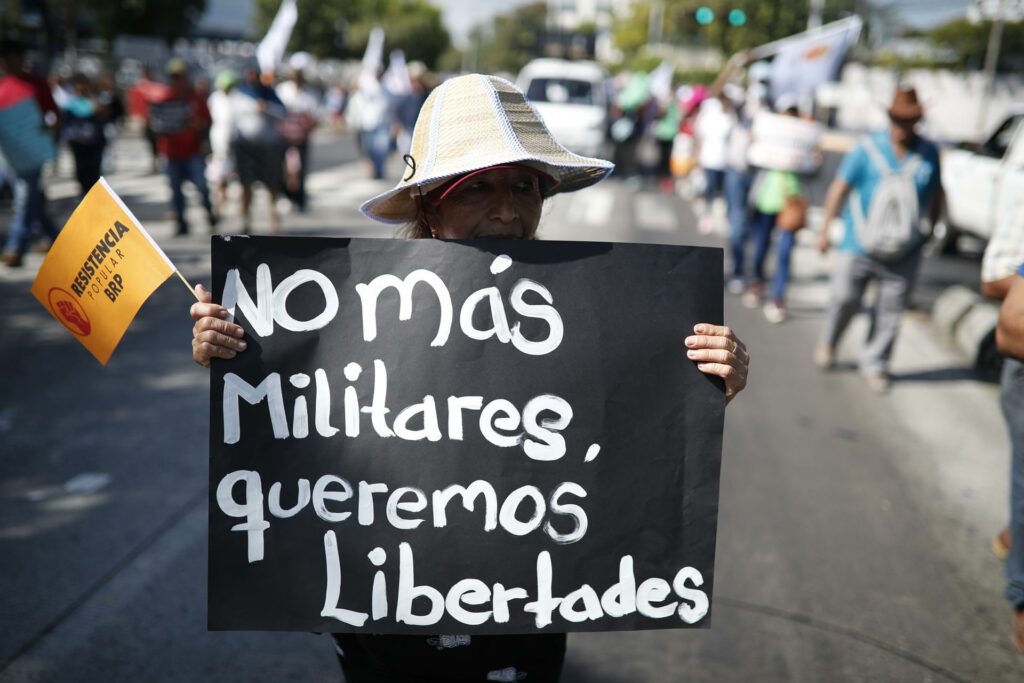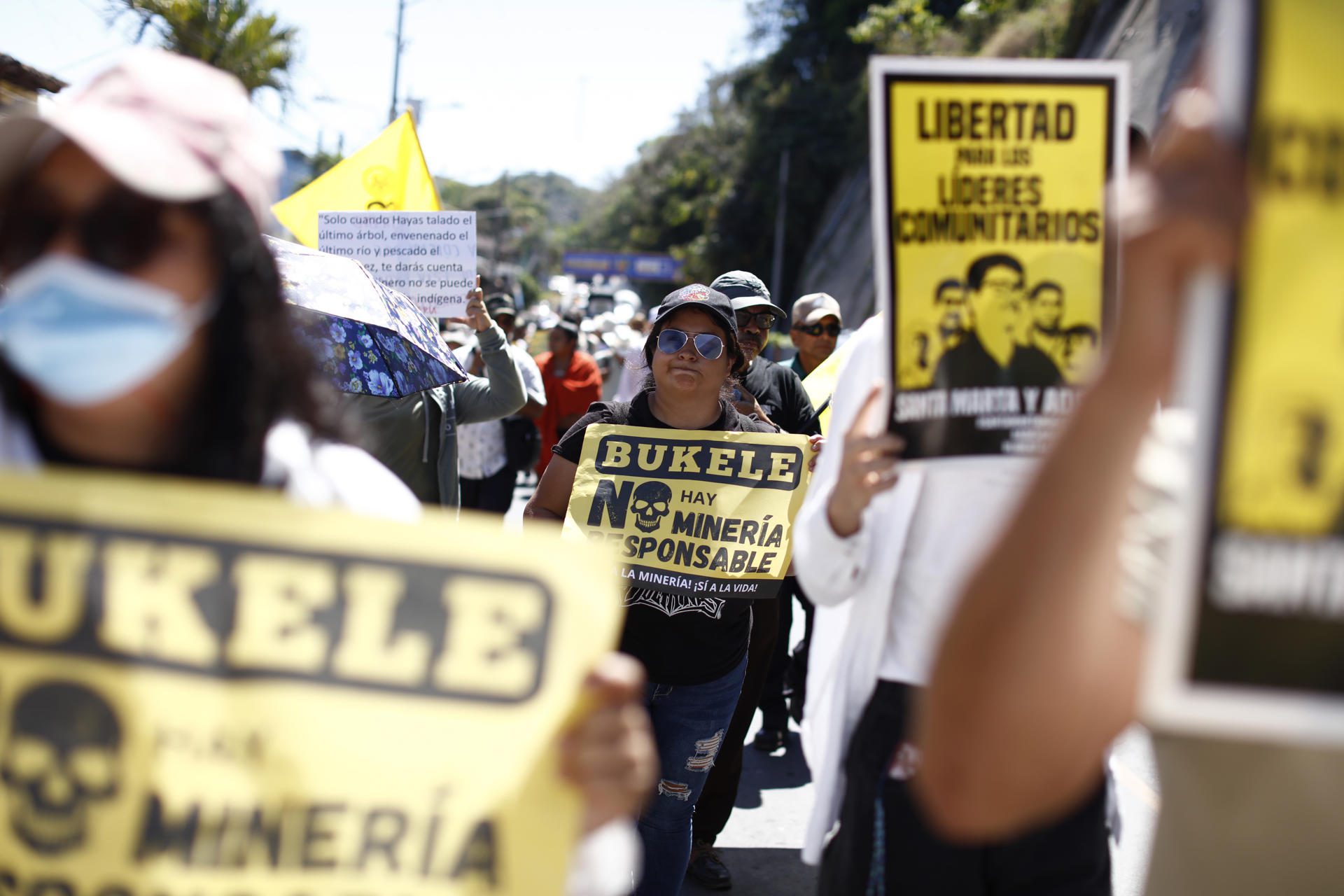Citizen signatures demanding the repeal of the General Law on Metallic Mining—approved by El Salvador’s Legislative Assembly on December 23—are piling up by the thousands. While an exact count is currently unavailable, more than 30,000 signatures were gathered in the first few days alone. Three weeks have now passed since churches, universities, and social organizations opened their doors to citizens opposed to the law, hoping to push the Constitutional Chamber of the Supreme Court of Justice to reverse the mining initiative.
According to Ruth López, head of the Anti-Corruption Program at the human rights organization Cristosal, opposition to the law, which revives the possibility of metallic mining after a seven-year ban, has been widespread across the country.
Though the call for signatures was initiated by the Salvadoran Catholic Church, the protest has gained broad support, even among those who back President Nayib Bukele’s administration.
The goal is to collect one million signatures—both to challenge the law’s constitutionality before the Constitutional Chamber and to demand its repeal by the Legislative Assembly. Lawmakers approved the bill in just 98 minutes—including the reading of the proposal—without debate, civil society participation, or prior consultation with the communities directly affected by mining projects.
“This is a nationwide movement,” López explains. “The law is being challenged for violating the right to a healthy environment, access to water, international treaties, legal progressivity, and even the legislative process itself, which was highly irregular.”
While such a large number of signatures isn’t legally required to submit a challenge, the goal is also to demonstrate widespread public discontent, says Keyla Cáceres of the feminist organization Asamblea Feminista.
Even as they get closer to their target, López acknowledges that the chances of overturning the law remain slim, given the ruling party’s tight grip on state institutions.
“There is no functional system of accountability. Therefore, it is unlikely that the judiciary—specifically the Constitutional Chamber—will reverse or declare this law unconstitutional,” the lawyer explains.
“The most probable outcome is that the Court will reject the petition outright because the judges lack independence. They do whatever the unconstitutional Nayib Bukele orders. The rule of law does not exist at this moment. Otherwise, we would have some hope, as the original mining ban was based on solid human rights arguments,” Cáceres adds.
With 54 out of 60 legislators aligned with the government, the Legislative Assembly serves the president’s will rather than acting as a check on executive power, López asserts.
“Between 2021 and 2024, 43% of the laws passed by the Assembly originated in the Executive Branch. These laws were approved without proper legislative process, debate, or even minor edits. Lawmakers openly state that they are in office to support the president. We just saw this with the passage of a law that affects the entire Salvadoran population,” she continues.
While the likelihood of success is low, this citizen-led initiative is a necessary first step before taking the Salvadoran state to international courts, López emphasizes.
The Salvadoran State Conceals Mining Information

The approval of the General Law on Metallic Mining on December 23, 2024, repealed the 2017 ban on metallic mining, which had been achieved after decades of advocacy by environmental organizations, affected communities, churches, and various civil society groups.
The 2017 ban legally recognized metallic mining as a threat to public health and life, particularly due to its severe impact on water resources.
However, alleged studies classified as confidential by the General Directorate of Energy, Hydrocarbons, and Mines (DGEHM) claim that only 4% of a mine in San Sebastián contains 50 million ounces of gold, currently valued at $131.6 billion.
This so-called “trade secret” study was the main justification used by the Legislative Assembly to repeal the mining ban and pass the new law.
Bukele has argued that mining will create jobs, boost economic development, and generate revenue for public policies. The law grants the state exclusive rights to explore, extract, and process the country’s natural resources through designated institutions or other authorized entities.
However, besides the lack of publicly available information about this decree, the bill was approved without prior discussion or legislative debate. It was introduced and passed within just three days, without consulting civil society or seeking input from independent experts.
“There has been a clear lack of transparency and public participation in this decision. The government has deceived the population,” says Ruth López of Cristosal.
The Legislative Assembly claims that, unlike in the past, this time mining will be conducted sustainably using best practices. However, those opposed to the law remain skeptical due to the government’s lack of transparency.
The government’s secrecy extends beyond this new law. Even previous reports on mining remain classified. On January 31, the Ministry of Environment and Natural Resources (MARN) declared that information regarding compliance with court-ordered environmental measures in San Sebastián would be kept confidential until 2030, according to a report by La Prensa Gráfica.
In 2019, a court ordered environmental protections to mitigate the impact of mining in the region. However, MARN has refused to disclose any details, claiming the information will remain confidential until the case is resolved in February 2030.
The Threat of Protesting Under the State of Emergency

Protests against the mining law pose a new challenge amid ongoing government repression of free speech and peaceful assembly under El Salvador’s state of emergency, which has now lasted nearly three years, says Keyla Cáceres of Asamblea Feminista.
Since the emergency regime began on March 27, 2022, not only suspected gang members but also human rights defenders, journalists, union leaders, and environmental activists have been detained for opposing Bukele’s policies, López explains.
“El Salvador’s civic space has been shrinking. The government has used the state of emergency to suppress freedoms of expression and association,” she says.
Among those arrested are five environmental leaders from the Santa Marta community in Cabañas: Miguel Gámez, Alejandro Laínez, Pedro Rivas, Teodoro Pacheco, and Saúl Rivas. They were detained in January 2023 and charged with a homicide allegedly committed in 1989 during the civil war.
In October 2024, the Association for Economic and Social Development of Santa Marta (ADES) publicly denounced the case as “a manipulation of the criminal justice system to persecute environmental activism” and pave the way for mining.
The trial was set to begin on February 3 but was postponed indefinitely. ADES condemned the delay as a tactic to prolong the unjust proceedings against their community leaders, according to a statement on their social media.
Cáceres notes that exercising the right to protest often leads to harassment by the National Civil Police or the military. In many cases, the intimidation extends to protesters’ families.





